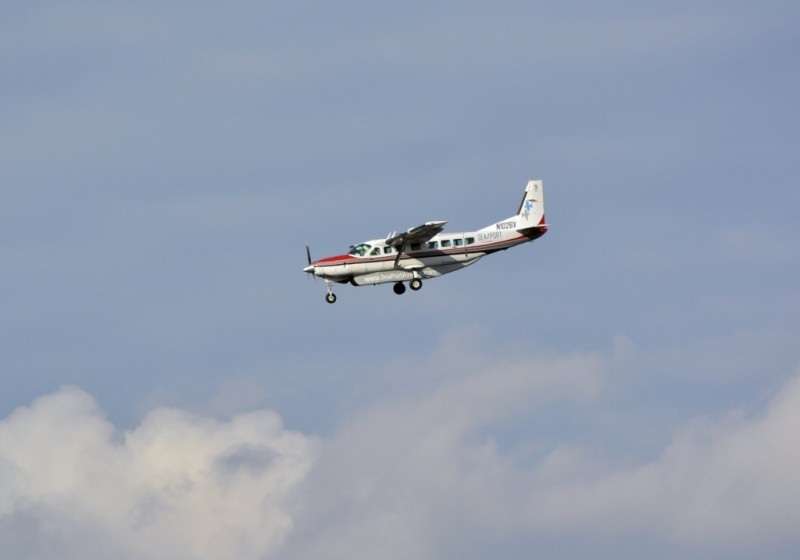Judge OK's DHS Tracking Plane Because It Left L.A., a 'Source City' for Drugs, Going to Philly, a 'Destination City'
Another judge rules that behaving legally is no protection from being targeted by law enforcement.


Police may have reasonable suspicion to track individuals if they are behaving strangely while traveling or using unusual means of travel, even if the behavior or means of travel are legal, Chief Judge David Brooks Smith ruled (pdf) in a case in the Third Circuit Court of Appeals involving the Department of Homeland Security (DHS) tracking a plane from Los Angeles to Philadelphia because the former was a "source city" for drugs and the latter a "destination city,"—demonstrating the vagueness of the concept of reasonable suspicion and the problem with criminalizing actions and products that are inherently non-violent.
In 2015 the pilot and passenger Raul Rosales, who brought the challenge to the court, were apprehended in Pennsylvania, where authorities found them in possession of several duffle bags' worth of cocaine. Rosales was sentenced to five years in prison and was appealing a lower court's ruling that evidence obtained based on DHS's tracking of the plane because of perfectly legal behavior ought to be suppressed
"Unusual means of travel or strange behavior while traveling, even if legal, may give rise to reasonable suspicion," Smith wrote in his disposition. "While Rosales is correct that the flight could have been that of a hobbyist and that some of the details observed… could be attributed to inexperience rather than criminal activity, an alternative innocent explanation does not undermine our conclusion."
DHS also pointed to the plane making too many stops and to a police informant who claimed to see a duffel bag on board and noticed and noticed the pilot locking the aircraft despite only exiting briefly for refueling in Albuquerque. In Oklahoma, another informant told DHS the plane had taxied backward down the runway, indicating an inexperienced pilot. DHS also said the plane's transponder had been shut off for three minutes over Kentucky. Judge Smith ruled that in combination, these legal activites were all enough to warrant reasonable suspicion.
The ruling, which was nonprecedential, meaning it doesn't add "significantly to the body of law," as Federal Circuit Rule 32.1 explains (pdf), nevertheless adds to a long list of what law enforcement can consider reasonable suspicion—from driving too slow to driving too fast, from being too relaxed to being too nervous.
"Articulating precisely what 'reasonable suspicion' and 'probable cause' mean is not possible," the Supreme Court ruled in the 1996 case Ornelas v. U.S. "They are commonsense, non-technical conceptions that deal with the factual and practical considerations of everyday life on which reasonable and prudent men, not legal technicians, act. As such, the standards are not readily, or even usefully, reduced to a neat set of legal rules."
Neat! The vague nature of reasonable suspicion highlights the importance of limiting criminal laws to actions that are violent, and not to all behaviors and products that make the right amount of the right people uncomfortable, to safeguard our freedoms, such as they are.
Editor's Note: As of February 29, 2024, commenting privileges on reason.com posts are limited to Reason Plus subscribers. Past commenters are grandfathered in for a temporary period. Subscribe here to preserve your ability to comment. Your Reason Plus subscription also gives you an ad-free version of reason.com, along with full access to the digital edition and archives of Reason magazine. We request that comments be civil and on-topic. We do not moderate or assume any responsibility for comments, which are owned by the readers who post them. Comments do not represent the views of reason.com or Reason Foundation. We reserve the right to delete any comment and ban commenters for any reason at any time. Comments may only be edited within 5 minutes of posting. Report abuses.
Please to post comments


It seems to me "reasonable" shouldn't depend as much on forecasting as statistical evidence. Is it reasonable to conclude a pilot acting suspiciously might be a drug dealer? I don't know - how many pilots acting suspiciously has DHS tracked and found to be drug dealers? If your database is this one pilot, 100% accuracy looks pretty damn good. But if they've tracked hundreds of pilots and found only a few drug dealers, yeah, your suspicion ain't worth shit.
Parallel construction.
His behavior didn't arouse suspicion. That's just the "parallel construction" necessary to hide the unconstitutional surveillance.
Nailed it.
I think you've hit the nail on the head here. I think we all know this is going on by now.
I think we all know this is going on by now.
The real question is which kind of unconstitutional. The NSA spying unconstitutional or the DEA double-crossing informants who they promise stuff for snitching unconstitutional?
Whoever approved those flight plans has got to be sweating his balls off.
Do we really need to choose? Why not both!
Yep. That's usually what jumps off the page when you hear of some guy getting stopped/searched for things that are either common, vague, or mundane, and whaddauknow....there's $100K of drugs on him!
I'd love to see the statistical correlation between stops for trivialities like failure to signal and any resulting busts, versus more legitimate stops (like speeding 20mph+) and the drug busts that result from those.
Without parallel construction the rates should be roughly equal. But I'd be willing to bet that the trivial infractions result in a much higher percentage of officers getting "lucky".
The alt text made me laugh harder than was probably reasonable.
This is all clearly spelled out in the The Ends Justify The Means section of the Drug Enforcement Exception Clause of the Fourth Amendment of the United States Constitution.
Drugs were found, so obviously they were justified.
Nah; depends on circumstances.
In other news of judges behaving badly, sometimes the man bites the dog back.
I don't know if this has been posted before, but the Daily News deserves some respect for this even if they are otherwise a NY tabloid piece of trash.
-Los Angeles to Philadelphia:"source city" to "destination city,"
-Too many stops
-Police informant who claimed to see a duffel bag on board
-Noticed the pilot locking the aircraft despite only exiting briefly for refueling in Albuquerque.
-In OK informant told DHS the plane had taxied backward down the runway
-DHS also said the plane's transponder had been shut off for three minutes over Kentucky.
So I certainly agree that the WOD is patently stupid and, in and of itself, violates the US Constitution. And, of course, just searching someone because they flew from LA to Philly is obviously unconstitutional. And I also am suspicious of the veracity of so many informants.
Having said all that, I think that all of the above listed things, when taken in toto, would constitute reasonable suspicion. (Again, there shouldn't be laws against carrying cocaine)
Add to that, the idiot reached into the duffel bag and let the officers see marijuana. And then they ran. Then AFTER receiving a Miranda warning, proceeded to confess to carrying.
If the circumstances were exactly the same, but instead of drugs, there was stolen goods, or body parts in the bag, it seems like this would have been a perfectly legitimate arrest.
So the issue is not reasonable suspicion, but the WOD.
(Again, there shouldn't be laws against carrying cocaine)
I agree and think this to be the low-hanging fruit here. I don't think the you can criticize the subtleties of covert observation and statistical inference or hunches sharply enough to fight and win any libertarian battles.
Certainly Reason with its vein popping hatred for law enforcement and sympathy for drug smugglers can't.
Wanting law enforcement to hold its own to account when they act as criminals or violate civil liberties =/= vein popping hatred for law enforcement.
Why not have sympathy for people punished for engaging in victimless crimes?
That all sounds nice, except that the drug warriors started tracking him as soon as he left LA, before any of that stuff happened. You can't retroactively claim that the shit he did after you started tracking him was the suspicious behavior that caused you to start tracking him in the first place, temporality only works in one direction in this universe. (As far as we know.)
Right but, again, were they literally watching him on radar from the time he left or did he just fly low enough/land frequently enough that they were able to ping his cell phone? Or as, I asserted above, did some undercover DEA agent or informant tell them where the plane would depart from and land? How would we ever definitively know? Except to (continue to say) drugs shouldn't be illegal and, fuck you, cut spending?
my thoughts exactly
I love Reasons hyper-qualified defense of free speech married to a completely unqualified defense of drug smugglers. Basically Reason hates Ann Coulter more than drug smugglers which is why libertarianism is such a delightfully inept movement.
I love Reasons hyper-qualified defense of free speech married to a completely unqualified defense of drug smugglers.
I gotta admit that *clinches teeth, sets jaw* the open borders stance, combined with the 'people should be able to fly a plane wherever and whenever they want to' stance makes it seem like Reason might not exactly be never forgetting.
*hides behind 'any serious condemnation of Trump should also condemn those who facilitated his presidency.' shield*
Aren't all planes tracked every where?
It would be helpful if the "source" cities and "destination" cities were published. Are we supposed to believe that if this guy had flown in the other direction that the court would invalidate the search, that LA wouldn't be a destination and Philly a source?
Likewise, precisely what type of luggage is suspicious and what isn't. I mean, a duffel bag? Being used by a guy who's traveling? That's crazy talk.
Also, how long you have to leave your vehicle before locking it is no longer suspicious behavior.
Wouldn't any city over a quarter million people be considered a "destination city"?